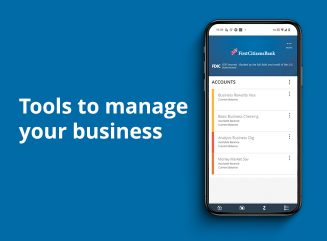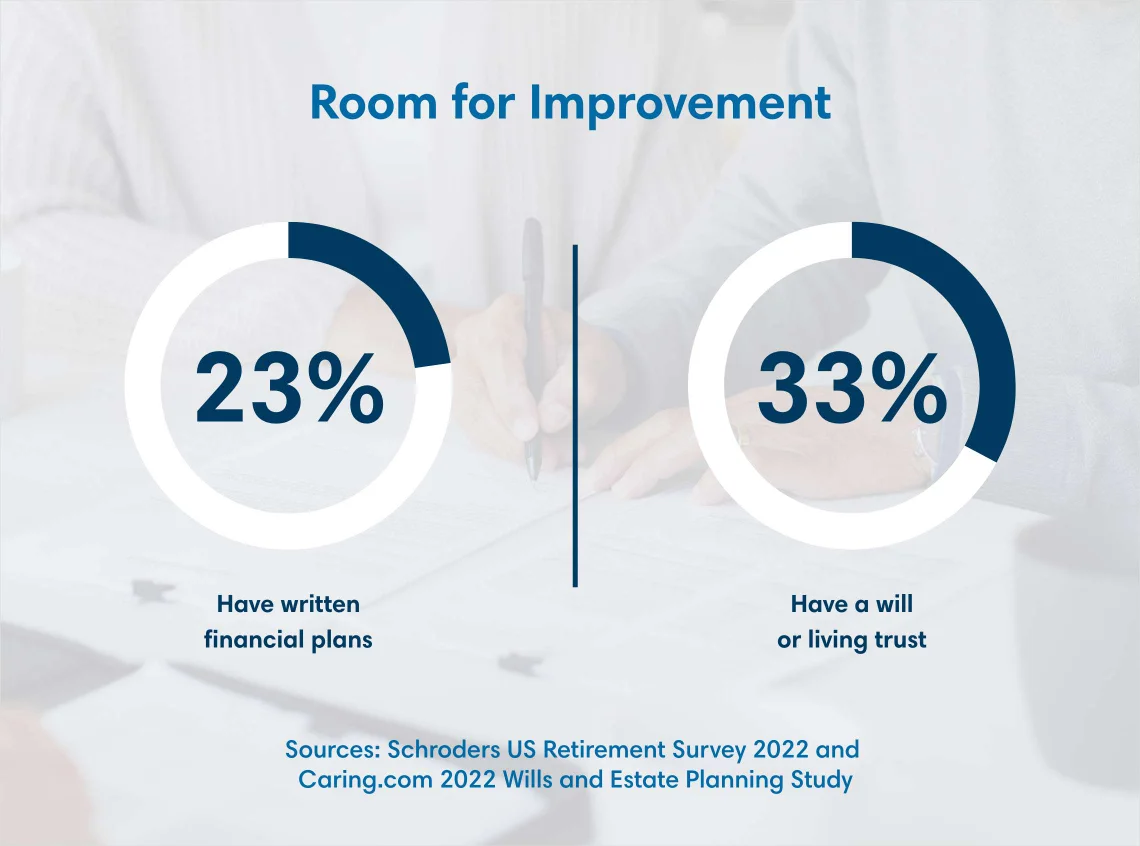Digital banking for business
Seamlessly access all of your accounts from one place with First Citizens Digital Banking for business.

Invest how you want, when you want, in real time with Self-Directed Investing.

Seamlessly access all of your accounts from one place with First Citizens Digital Banking for business.
We're committed to serving companies as they expand and succeed. The proof is in our success stories.
2026 Market Outlook video: Available now
The Making Sense team reflects on 2025 and discusses key headwinds and tailwinds for 2026.
With inflation boosting the cost of living, interest rates on the rise and talk of a recession in the headlines, it's more important than ever to pause and assess your finances. Whether you're thriving or you feel like you need to improve your bottom line, a midyear financial checkup can keep you on track with your long-term goals.

Now is a great time for a financial checkup so you can review your financial goals and see if there's anything else you need to update before the end of the year. Brandie Fintchre, CFP, Premier Banking Program Manager at First Citizens, recommends covering these five major themes when conducting a midyear financial checkup.
First, review your spending and savings and make sure you're following your budget. While this may sound basic, it's easy for your budget to become inaccurate when costs or your income are changing.
"Are my inflows greater than my outflows?" Fintchre and her team of relationship bankers tell their clients to ask themselves. "The budget is the road map. It helps you to control where your spending goes."
The goal is to spend less than you earn while saving for long-term priorities—such as retirement and college costs for children—as well as short-term goals like vacations. Interest on debt is one important expense to watch. With rising interest rates and economic uncertainty, it's a good idea to try eliminating your high-interest and variable-rate debts.
For example, let's say you're carrying a balance on your credit card. You could transfer the balance to a card with a 0% interest rate offer or refinance it to a lower fixed rate through a home equity line of credit or cash-out mortgage refinance. Use a credit card payoff calculator to determine how long it'll take to pay off the debt. And remember to pay it off before the 0% introductory rate expires or you'll be charged interest for the entire balance.
"We don't want you to continue to carry revolving debt in perpetuity," Fintchre says. "Let's free up your cash flow so you've got more to use to build savings."
Saving for important goals like retirement is critical to your financial success. At your midyear financial checkup, you should review how much progress you're making toward building your savings.
You can't control the ups and downs of the market, so the balance in your investment accounts isn't necessarily what to focus on in this checkup. Rather, the question is whether you're continuing to put money away and make progress toward retirement, college savings and other key goals.
Taking your best shot at achieving your goals requires having a written financial plan, but only 23% of respondents to wealth advisor Schroders' US Retirement Survey for 2022 reported that they have written plans.
"This means more than seven out of 10 individuals have no idea if their current actions to save, invest, protect and manage their cash flow are really working to their advantage," Fintchre notes. "We want to make sure everyone has that financial road map for success."
If you don't have a plan, building one can start with a simple conversation with your banker. If you need other experts involved, your banker can call them in for you as needed.

Sources: Schroders US Retirement Survey 2022, Caring.com 2022 Wills and Estate Planning Study
No matter how much planning you've done, life happens. People lose jobs or get sick. Your roof can spring a leak unexpectedly, or an elderly parent can require extra care.
"Having protection strategies as a part of your financial plan is a must," Fintchre says. While you can't predict exactly what might happen and when, you can take steps to protect yourself financially.
First, check your emergency fund. A good guideline is to have 3 to 6 months of living expenses available to protect against large, unexpected costs or job loss.
Insurance is also critical to protect you and your family. A disability insurance policy that will replace 60% to 70% of the primary earner's income can provide financial protection and peace of mind.
A midyear financial checkup is also a good time to ensure your estate planning documents—a will, power of attorney and healthcare power of attorney—are up to date. It's also important to ensure that the beneficiary designations on your bank accounts, investment accounts and insurance policies are current.
"If COVID has taught us anything, it's that we need to prepare for the worst-case scenario," Fintchre notes.
A 2020 LegalZoom survey found that the pandemic changed some people’s attitudes toward estate planning, with 32% of 18- to 34-year-olds saying they created a will as a result.
It's also important to protect your major assets. Home prices have soared, as has the value of used cars. Do your homeowners and auto insurance policies reflect the actual value of your assets? If not, consider increasing coverage.
Although no one likes thinking about it, life insurance is also vital. A life insurance policy should replace the primary earner's income, as well as future college costs for children, funeral expenses and anything related to legacy planning, such as important charitable contributions.
Your midyear financial checkup is a good time to pull out your employee benefits handbook and make sure you're taking advantage of all relevant company benefits.
On the financial planning side, this could include things like contributing enough to a 401(k) plan to maximize your employer's matching contribution. Even when times are tight, this is bonus money that's added to your retirement savings.
Your employer may also offer benefits that can help you manage your family's health and overall well-being. Some companies, for example, offer free gym memberships and provide mental health counseling. You may not be able to make immediate changes to your benefit choices now, but it's still worth reviewing them.
"When you get to your employee benefits open enrollment period, you can start implementing what you've uncovered during your midyear checkup," Fintchre says.
Let's say your midyear financial checkup reveals that your financial health is strong: Your income is healthy, expenses are under control, you're making good progress toward your long-term financial goals and your family's assets are protected.
If you have extra income available, Fintchre says, maybe it's time to think about how you "live, give and dream."
"We're not getting any younger," she says. "Let's prioritize vacations. Let's prioritize living while you're young and healthy and able to enjoy travel."
Giving also allows you to improve the lives of others in a way that aligns with your values.
"There's joy in giving," Fintchre notes. "Giving is one of the ways you can use that cash flow to make your life and the lives of others better."
Finally, dreaming is an opportunity to take a second look at your financial plan and ask yourself if there's a way to accelerate it.
"I may want to retire at age 60," Fintchre says. "If you've got extra cash flow, you may want to dream about retiring even earlier by investing while the market is a little lower. You're buying on discount, and you're able to take advantage of that upside.''
Learn how life planning can help build your dreams, whatever they may be.



Account openings are subject to bank approval.
Your investments in securities and insurance products and services are not insured by the FDIC or any other federal government agency and may lose value. They are not deposits or other obligations of, or guaranteed by any bank or bank affiliate and are subject to investment risks, including possible loss of the principal amounts invested. There is no guarantee that a strategy will achieve its objective.
About the Entities, Brands and Services Offered: First Citizens Wealth® (FCW) is a registered trademark of First Citizens BancShares, Inc., a bank holding company. The following affiliates of First Citizens BancShares are the entities through which FCW products are offered. Brokerage products and services are offered through First Citizens Investor Services, Inc. ("FCIS"), a registered broker-dealer, Member FINRA and SIPC. Advisory services are offered through FCIS, First Citizens Asset Management, Inc. and SVB Wealth LLC, all SEC registered investment advisors. Certain brokerage and advisory products and services may not be available from all investment professionals, in all jurisdictions or to all investors. Insurance products and services are offered through FCIS, a licensed insurance agency. Banking, lending, trust products and services, and certain insurance products and services are offered by First-Citizens Bank & Trust Company, Member FDIC and an Equal Housing Lender icon: sys-ehl, and First Citizens Delaware Trust Company.
All loans provided by First-Citizens Bank & Trust Company and Silicon Valley Bank are subject to underwriting, credit and collateral approval. Financing availability may vary by state. Restrictions may apply. All information contained herein is for informational purposes only and no guarantee is expressed or implied. Rates, terms, programs and underwriting policies are subject to change without notice. This is not a commitment to lend. Terms and conditions apply. NMLSR ID 503941
For more information about FCIS, FCAM or SVBW and its investment professionals, visit FirstCitizens.com/Wealth/Disclosures.
See more about First Citizens Investor Services, Inc. and our investment professionals at FINRA BrokerCheck.
This material is for informational purposes only and is not intended to be an offer, specific investment strategy, recommendation or solicitation to purchase or sell any security or insurance product, and should not be construed as legal, tax or accounting advice. Please consult with your legal or tax advisor regarding the particular facts and circumstances of your situation prior to making any financial decision. While we believe that the information presented is from reliable sources, we do not represent, warrant or guarantee that it is accurate or complete.
Third parties mentioned are not affiliated with First-Citizens Bank & Trust Company.
Links to third-party websites may have a privacy policy different from First Citizens Bank and may provide less security than this website. First Citizens Bank and its affiliates are not responsible for the products, services and content on any third-party website.
First Citizens Bank is a Member FDIC and an Equal Housing Lender icon: sys-ehl.
NMLSR ID 503941

Treasury & Cash Management
Electronic Bill Presentment & Payment
Investment & Retirement Services
Community Association Banking
Equipment Financing & Leasing
Credit Cards
Merchant Services
Email Us
Please select the option that best matches your needs.
Customers with account-related questions who aren't enrolled in Digital Banking or who would prefer to talk with someone can call us directly.